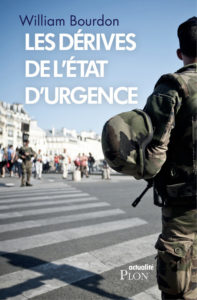WILLIAM BOURDON
Founding partner of Bourdon & Associés, member of the Paris Bar since 1980
William Bourdon acted as the 10th Secretary to the Paris Bar Association’s “Conférence du Stage” in 1981.
He is registered at the Paris Bar and the International Criminal Court.
William Bourdon’s main areas of practice are criminal law, including economic criminal law, as well as communications law, especially press, intellectual property and publishing laws.
He is also involved in major civil and commercial litigation and arbitration, often with an international dimension, as well as in inheritance matters, extradition procedures, administrative law, employment law and appeal before the European Court of Human Rights.
William Bourdon has also developed a consulting activity for several governments, NGOs and international institutions.
He pleads before all French Courts (Criminal, Administrative, Labour Courts etc.), as well as before administrative authorities (AMF).
He assists clients in France and abroad and speaks Spanish and fluent English.
Degrees
- 1978 – Bachelor in Public Law (Univeristy of Paris I)
- 1978 – Institute of Political Studies («Science-Po Paris»)
- 1979 – Master in Private Law (University of Paris I)
- 1981 – 1st Prize of the “Conférence du Stage” (the moot court pleading contest held by the Paris Bar association)
Publications
- Contribution to a collective book on the International Criminal Court in The Hague, 1994, Ed. L’HARMATTAN
- Contribution to a collective book on international justice in Rwanda, “La Justice Internationale face au drame rwandais” (“The International Justice facing the Rwandese tragedy”), March 1996, Ed. KHARTHALA
- Author in cooperation with Ms. Emmanuelle Duverger, of “La Cour Pénale Internationale – Le Statut de Rome” (“The International Criminal Court – The Rome Statute”), May 2000, Ed. du Seuil – Collection Point
- Contribution to the collective work “Droit international public” under the direction of Mr. Hervé Ascencio, Emmanuel Decaux et Alain Pellet (“Public international law”), October 2000, Ed. Pedone
- Contribution to the collective work “L’état de la Justice en France” (“The state of Justice in France“) under the supervision of Ms. Mireille Delmas Marty, October 2001, Ed. La Découverte
- Author of “Face aux crimes du marché. Quelles armes juridiques pour les citoyens?” (“Facing the market crimes. Which legal weapons for the citizens”), February 2010, Ed. La Découverte
- Contribution to the collective work “Au nom du 11 septembre – Les Démocraties à l’epreuve du terrorisme” (“In the name of 9/11 – Democracies to the test of terrorism“), September 2008, Ed. La Découverte
- Co-author of the study “Réguler les entreprises transnationales – 46 propositions” (“Regulating transnational compagnies – 46 propositions“), December 2010
- Contribution to “Contre l’arbitraire du pouvoir” (“Against the power arbitrariness“), Individual article entitled “L’exception antiterroriste” (“The anti-terrorism exception”), February 2012, Ed. La Fabrique
- Author of “Petit manuel de désobéissance citoyenne” (“A Little Handbook Of Civil Disobedience”), February 2014, JC Lattès
- Co-author, with Alia Anoun and Christine Chanet, of “La Palestine et la CPI” (”Palestine and the ICC”), January 2016, published by the Gabriel Péri Foundation
- Author of “Les dérives de l’état d’urgence” (“The drifts of the state of emergency”), January 2017, Plon
- Author of numerous articles in both international, general and specialized press outlets on the fight against impunity, terrorism, corruption, money laundering, market speculation, the International Criminal Court, environmental law, the status of whistleblowers, environmental crimes, etc.
- Participation in numerous conferences on international crime, particularly relating to financial crime and globalization; on terrorism; and the protection of whistleblowers.
Les dérives de l’état d’urgence
The drifts of the state of emergency
William Bourdon – January 26th 2017 – Editions : Plon
Co-authors : Amélie Lefebvre, Apolline Cagnat, Bertrand Repolt and Vincent Brengarth
France took such a drift towards securitarianism which accelerated since the Charlie Hebdo attacks that its legal arsenal is considered one of the most repressive in Europe. In this context, what are today’s and further potential drifts of the state of emergency towards our liberties and our democracy?
The tension between safety requirements (i.e. the fight against terrorism) and the protection of our liberties has never been so present at the heart of the democratic debate. This tension more than ever prompts our reflection in the lights of the terrorist attacks committed and the threats on France.

